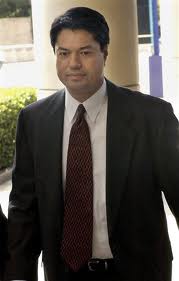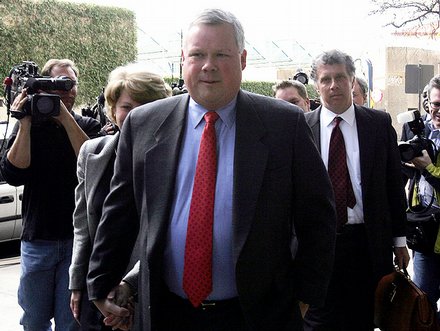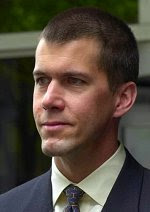 As noted earlier here, former Enron CEO Jeff Skilling will report to a minimum-security prison in Waseca, Minnesota on Tuesday to begin serving the brutal 24 year sentence that he was assessed on October 23rd.
As noted earlier here, former Enron CEO Jeff Skilling will report to a minimum-security prison in Waseca, Minnesota on Tuesday to begin serving the brutal 24 year sentence that he was assessed on October 23rd.
On January 2, former Enron accountant Richard Causey is scheduled to report to the federal prison in Bastrop near Austin to begin serving his five-and-a-half-year sentence that he received on November 15.
Former Enron CFO Andrew Fastow is serving his a six-year term in a federal prison at Oakdale, Louisiana that he received on September 26, and former Enron Energy Services CEO David Delainey is in a Lompac, California federal prison serving the two-and-a-half-year sentence that he received on September 19th.
But for some unknown reason, former Dynegy mid-level executive Jamie Olis — who has endured a three year ordeal in having his absurd 24 year sentence reduced to six years on September 22nd — remains in the marginally humane Federal Detention Center in downtown Houston awaiting reassignment to a federal prison.
Olis reported to federal prison on May 20, 2004 and was originally assigned to the Bastrop unit, about an hour and a half away from San Antonio where his wife and young daughter are living.
However, in January 2005, Olis was inexplicably yanked out of the Bastrop unit and transferred to a much harsher medium-security unit in Oakdale, Louisiana, 400 miles away from his family.
Then, after the Fifth Circuit set aside Olis’ original 24 year sentence on October 31, 2005, U.S. District Judge Sim Lake ordered Olis transferred to the Federal Detention Center in downtown Houston on December 20, 2005 to await his resentencing.
The Detention Center is essentially an interim facility containing small jail cells that are most commonly used to hold prisoners before the Bureau of Prisons assigns them to a federal prison where they will serve their sentence. It has nominal inmate facilities (it doesn’t even have a prison yard) and is ill-equipped to hold a prisoner for longer than a couple of weeks. Although closer to San Antonio than Oakdale, the Houston facility is still a four hour drive for the Olis family.
In transferring Olis to the Detention Center, Judge Lake probably thought that the resentencing would occur quickly and that it would be more expeditious to have Olis in Houston.
However, the prosecution engaged in a series of delaying tactics over most of the past year that delayed Olis’ re-sentencing until September 22, almost 11 full months after the Fifth Circuit ordered it.
To make matters even worse, Olis has now endured almost a year in his cramped Detention Center cell and still has not been assigned to a prison unit to serve the balance of his sentence. This despite the fact that he was re-sentenced three months ago and a number of federal criminal defendants sentenced after Olis — including Skilling, Fastow and Causey — have already been assigned to the prisons where they will serve their sentences.
The mainstream media has now moved on from the Olis case. But make no mistake about it, Olis’ continuing ordeal is a stark reminder of the injustice that is intrinsic to the dubious governmental policy of using the state’s overwhelming prosecutorial power to criminalize merely questionable business transactions.
Maybe some folks insulate themselves from the brutality of Skilling’s sentence because they simply can’t relate to a top executive of a large U.S. corporation, but most of us could have been in the same position as Olis.
As Sir Thomas reminds us, “do you really think that you could stand upright in the winds” of abusive governmental power that Jamie Olis is enduring?










